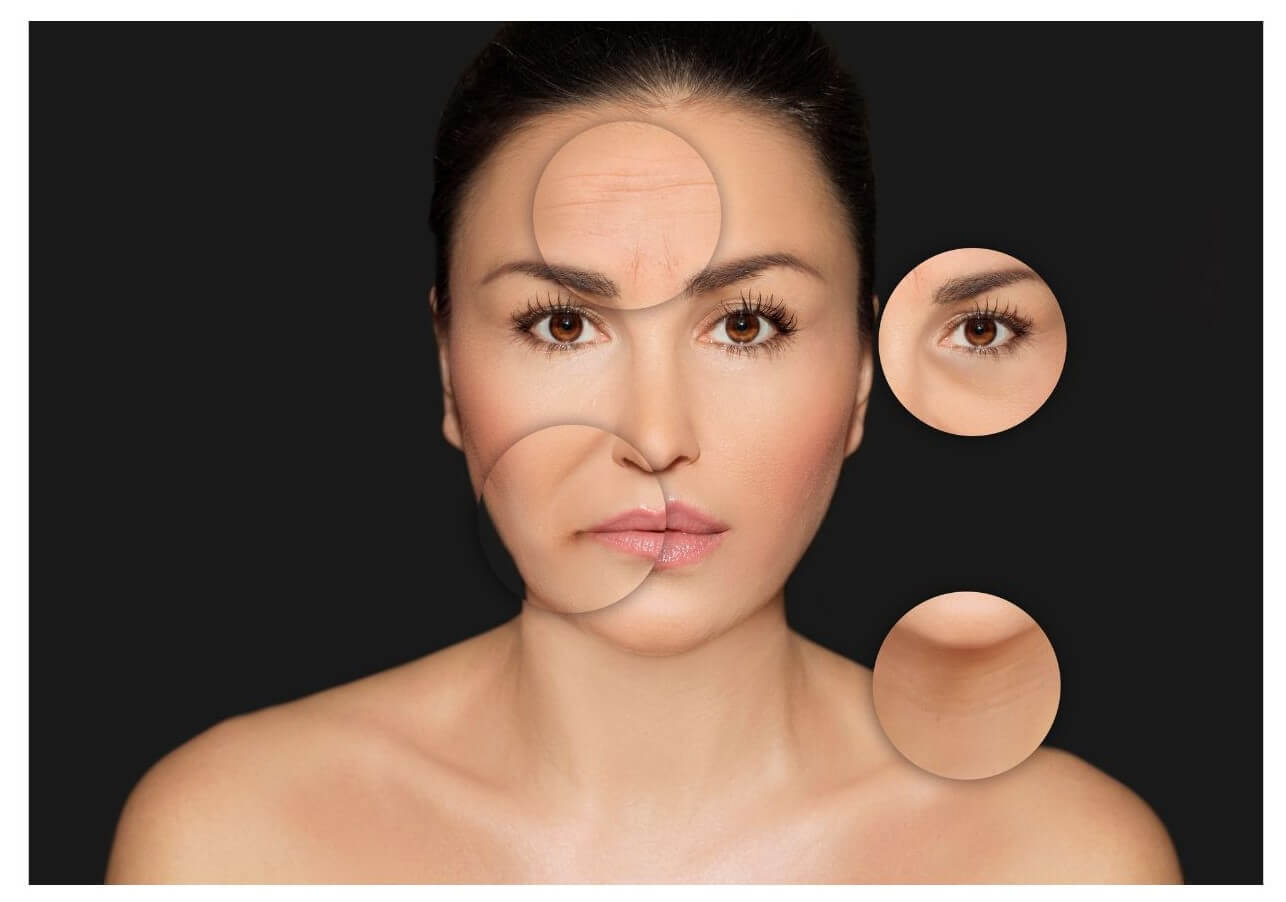As we age, our skin begins to lose its elasticity and firmness, with the main culprit being a reduced production of collagen. Collagen is the main structural protein responsible for your skin’s firmness and resilience, and it plays a vital role in maintaining a youthful appearance. However, skin aging isn’t the only thing that contributes to the decline of collagen production in skin.
Let’s explore what causes collagen breakdown in the skin (besides age) and the visible effects. Then, you’ll learn useful tips on how to stimulate collagen production for women looking to preserve a youthful complexion.
Learn how to leverage holistic health & the support of a like minded community in pursuit of your best self inside the Superwoman Circle.
Beyond Age: Unraveling Collagen Decline
Collagen is the primary structural protein in our skin, making up about 30% of the body’s total protein. It provides a strong-yet-elastic foundation that keeps it looking firm and smooth.
As we grow older, the production of collagen starts to slow down. Collagen breakdown in connective tissue as a result of age is responsible for most of the visible changes of premature skin aging, like wrinkles, sagging, and a loss of elasticity (1).

But while age is a significant factor, it’s not the only culprit behind these skin transformations. There are other factors that can speed up this decline, leading to premature skin aging.
Sun Exposure
Prolonged exposure to harmful ultraviolet (UV) rays from the sun can accelerate collagen breakdown and the effects of skin aging. In addition to wrinkles and a loss of elasticity, UV rays can cause age spots, discoloration, and other pigmentation problems (2).
Smoking
Smoking releases harmful reactive oxygen species (ROS) into the body, which damage collagen fibers and hinder collagen synthesis (3). Nicotine and other chemicals in cigarettes damage collagen fibers directly, leading to prematurely aged skin. Smoking accelerates the normal aging process of the skin, causing wrinkles to appear earlier than they would otherwise.
Poor Diet
Consuming an unhealthy diet lacking essential nutrients, antioxidants, and collagen-building proteins can affect collagen production. Plus, a diet high in processed and sugary foods can cause inflammation, leading to signs of accelerated skin aging.
Stress
Chronic stress triggers the release of cortisol, which can degrade collagen and impair the skin’s ability to regenerate (3). Stress can also cause issues like breakouts and frequent skin sensitivities.
High toxic load
Environmental pollutants, indoor VOCs, and other toxins can lead to oxidative stress, resulting in collagen damage (3). Pollution and other external factors can speed up the aging process, causing fine lines and wrinkles to appear earlier than expected.
Lack of Sleep
Insufficient sleep disrupts collagen synthesis and repair processes in the skin, since collagen production is at its highest during sleep. Being sleep deprived is also a stress state, which is proinflammatory and diverts resources away from protecting the skin (4). To make matters worse, not getting enough sleep can cause dark circles under the eyes, dry and dull skin, and an overall tired appearance.
Sugar and Processed Foods
High sugar consumption contributes to a process called glycation, which weakens collagen and elastin fibers (5). Processed and sugary foods trigger inflammation in the body, which weakens collagen production and impairs the skin’s ability to repair itself.
If you’ve noticed a pattern with inflammation & collagen breakdown, it’s because inflammation isn’t favorable for any part of your body, but it’s especially problematic for collagen.
Related: Top 5 Anti-Aging Antioxidant Foods for Glowing Skin
Effects of Declining Collagen in Women: Unveiling the Skin Changes

As collagen production decreases, women may notice various skin changes that go beyond the wrinkles commonly associated with aging skin:
- Sagging Skin: Collagen loss reduces skin’s elasticity, causing it to sag and lose its firmness.
- Fine Lines and Wrinkles: Less collagen leads to the formation of fine lines and wrinkles, especially around the eyes, mouth, and forehead.
- Thinner Skin: Collagen loss can make the skin appear thinner, more delicate, and prone to bruising.
- Uneven Skin Tone: Reduced collagen affects the skin’s ability to repair itself, leading to an uneven and dull complexion.
- Dryness and Dehydration: Collagen depletion can contribute to decreased moisture retention, resulting in dry and dehydrated skin.
Read: 7 Tips for Summer Skincare + My SPF Rules
What You Can Do to Increase Collagen Production
Now that we’ve established what causes collagen breakdown in our skin, it’s time to explore how we can increase collagen production.
More than just a collagen supplement

The health of your skin isn’t just about beauty—it’s an important measure of antioxidant status, nutrient absorption, and inflammatory markers. The goal of a collagen supplement is to protect the skin from damaging inflammation, and help build up the structural proteins that keep your skin looking hydrated, healthy, and youthful.
The blend of amla fruit, goji berry, hydrolyzed collagen, and hyaluronic inside CollaglowC was doctor-formulated specifically to support healthy skin, hair, and nails from the inside out. Mix one scoop of the unflavored powder with your favorite green smoothie for added nutritional benefit.
While we cannot halt the natural aging process, there are several steps women can take to support collagen production and maintain youthful skin:
Protect from Sun Exposure: Use sunscreen with at least SPF 30 daily and seek shade when the sun’s rays are strongest.
Nourish with a Balanced Diet: Consume a healthy diet rich in collagen-boosting nutrients, such as vitamin C (found in citrus fruits), vitamin E (present in nuts and seeds), and lean proteins like fish and poultry. Omega-3 fats in fish and other seafood also keep inflammation from running rampant and damaging natural collagen production.
Stay Hydrated: Water accounts for approximately 60% of collagen’s total weight. In experiments where researchers have removed the water from collagen, they’ve noticed a drastic reduction in its elasticity and strength (6).
Manage Stress: Engage in stress-reducing activities such as yoga, meditation, or spending time in nature. Stress reduction also helps keep cortisol levels in check, which is key for managing inflammation.
Quit Smoking: Breaking the habit will not only improve overall health but also protect collagen from degradation.
Invest in Skincare: Choose skincare products with collagen-boosting ingredients like peptides and antioxidants.
Consider Collagen Supplements: Collagen supplements, available in various forms, may help support collagen synthesis from within (7).
Get Enough Sleep: During sleep, collagen production is accelerated. Aim for 7-9 hours of quality sleep each night to promote skin repair and collagen production.
What to remember
Understanding the various factors that contribute to collagen decline in the skin is crucial for women seeking to maintain a youthful appearance. By adopting healthy lifestyle habits, protecting the skin from external aggressors, and nourishing the body with collagen-friendly nutrients, or collagen supplements, you can embrace your skin’s natural beauty and maintain a radiant glow that defies the passage of time. Remember, it’s never too early or too late to start caring for your skin and preserving its precious collagen for years to come.
Resources
- https://www.sciencedirect.com/science/article/abs/pii/S0945053X17301300
- https://pubmed.ncbi.nlm.nih.gov/27720464/
- https://www.ncbi.nlm.nih.gov/pmc/articles/PMC6629960/
- https://pubmed.ncbi.nlm.nih.gov/20678867/
- https://www.ncbi.nlm.nih.gov/pmc/articles/PMC9655929/
- https://www.ncbi.nlm.nih.gov/pmc/articles/PMC6536550/
- https://www.ncbi.nlm.nih.gov/pmc/articles/PMC8824545/


